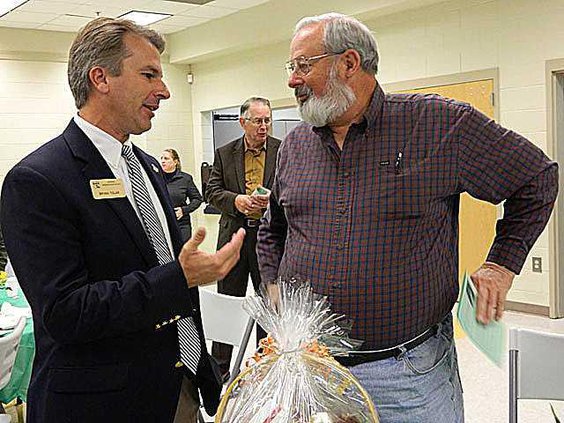When Georgia House Bill 87 passed this summer, many laborers left the state, fearing deportation.
Their departure cost the state’s agriculture industry $140 million in farm gate value and a total economic loss of $300 million. It’s an issue at the forefront of the industry, said Bryan Tolar, president of the Georgia Agribusiness Council.
“One of the challenges we face this year is not one that is captured with technology or conservation ... it’s a challenge we face if we’re going to run businesses, and that’s the challenge of labor,” Tolar told attendees at Tuesday’s Farm-City Breakfast. “We saw this year a response of labor source that left our state and left in a hurry, leaving our producers in their spring harvest in a bad place. ... We had crops that couldn’t be harvested.”
There has to be a labor source in order for Georgia agriculture to continue to embrace new biotechnology, chemistry and technological advances, Tolar said.
“We know that agriculture’s a lot different now that even just 10 years ago, and we should all be very proud of that,” he said. “We have finally achieved 7 billion people in our world population. We’ll be over 9 billion by 2050. We’re going to have to feed these folks. ... As people get more money, they want to eat more chicken and beef. As you grow that protein consumption, it takes more crops to produce that meat product. It compounds one thing after another. That’s not a bad thing. It’s an opportunity.”
New efficiencies, such as new seed genetics, for the industry have made it possible for one farmer, on average, to feed 155 people. In 1940, that average was 19 people, Tolar said.
The production increase comes along with higher quality pesticides that don’t have to be applied as often and better irrigation systems.
“All these components mean one thing — better agriculture,” Tolar said. “We’ve got a lot to be proud of, but we’ve got a long way to go.”
Mike Haynes, a Gainesville-based dairy and poultry farmer, appreciated Tolar for coming out to share the industry’s message.
“I’d like for the city to see what goes on and where the food comes from, and what it takes to get the food from the store to the table,” he said.
Haynes’ thoughts echo the mission of Farm-City Week, which was declared at the breakfast.
“It’s the connection between the farmer and the people who consume the products,” said Michael Wheeler, Hall County Extension agent. “What affects agriculture also affects us. That’s what’s important with the labor shortage this summer. When people couldn’t work, that’s less food on the table.”
Tolar said it’s important to keep that conversation going.
“Farms are where it starts, but our homes are where it ends,” Tolar said. “We have to be advocates for our own industry.”

